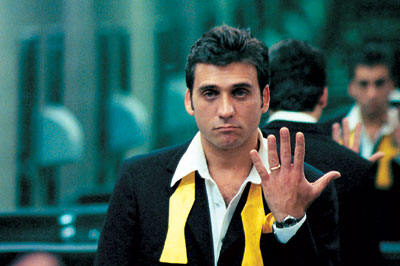FLOWER POWER
By Scott Macaulay
 |
| Late Marriage |
WHEN NEW YORK productionhouse The Shooting Gallery opened its doors in 1990, its rough-around-the-edges office and studio space on lower Broadway — the one with the crooked wooden floor — branded the outfit with an immediate outsider élan. The company “traded up” rather quickly, though, and just before its financial implosion in 2001, one could witness the odd sight of expensive digital editing equipment being wheeled into the company’s pricey post facilities while pink-slipped employees shuffled out of the modish production offices overhead.
One Shooting Gallery division never abandoned an aesthetic of frontier frugality, though. The Shooting Gallery Film Series, which parlayed corporate coin into cost-effective distribution of acclaimed, but not necessarily commercial, foreign and American indie films, was a pool of black ink within the larger company’s sea of red. So, when The Shooting Gallery folded, the first question off any non-creditor’s lips was where the Film Series’ founder, Eammon Bowles, would land.
Happily, Bowles has touched down at another start-up distribution company — Magnolia Pictures — which is again dedicated to cutting-edge cinema. And from the “no overhead” looks of the company’s spartan Chelsea offices, Bowles and fellow Shooting Gallery vet Ryan Werner are still in it for the love of film. “So many start-ups staff up in big offices,” Bowles says, “but all that smoothness comes with a price. We are going to ‘rough it,’ which is just what indie filmmakers have to do. We will be totally organic and build as our needs emerge.”
While Bowles formed Magnolia after The Shooting Gallery went under, the seeds of the company are actually in another bankruptcy. Explains Bowles, “Bill Banowsky, the general counsel at [radio network owner] Hicks-Muse saw the bankrupt theater business and realized that there was no national art theater chain outside of Landmark. He had the idea of also getting into distribution. He called me up, we had lunch, and I was impressed — he’d done his homework.”
Soon Banowsky and Bowles hatched plans for Magnolia, a distribution company that will also own its own chain of arthouse theaters. The first five-screen multiplex — called, naturally, the Magnolia — opens this month in Dallas. Banowsky had picked up the still-in-construction theater from Silver Cinema, which had entered bankruptcy, and completed the construction. The five-screen house will have a bar and one calendar screen, with the other four showing indie arthouse fare. Opening the theater will be a run of Krzysztof Kieslowski’s The Dekalog as well as a festival of Rialto releases like Rififi and Band Of Outsiders.
Of the kind of distribution deals he’s offering, Bowles admits, “We are in the low-advance business. We have a number of investors, Dallas-based, and if something bigger comes up, they’ll consider it. The business model I have always admired is, ‘be creatively adventurous but fiscally conservative.’”
In addition to the imminent announcement of two more theater acquisitions (“Magnolia, whether it is buying theaters or films, pursues a strategy of individual opportunity,” adds Bowles), the company has three films on its slate. It picked up U.S. rights to Larry Fessenden’s philosophical horror pic Wendigo from Ed Pressman and John Schmidt’s ContentFilm, which had purchased world rights to the movie from its producer, Jeff Levy-Hinte. “I’ve been a fan of Larry’s work for years,” says Bowles, “and this film is a quantum leap for him. I was surprised no one threw big money at it.” Magnolia is also releasing Dover Koshashvli’s 2001 Un Certain Regard entry Late Marriage and, this spring, Harry Shearer’s comedy Teddy Bears’ Picnic.
VOD CALENDAR


 See the VOD Calendar →
See the VOD Calendar →


